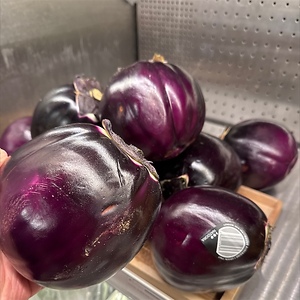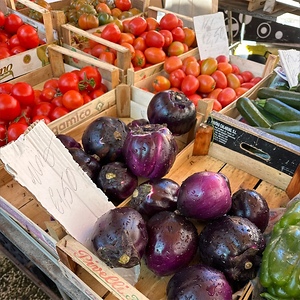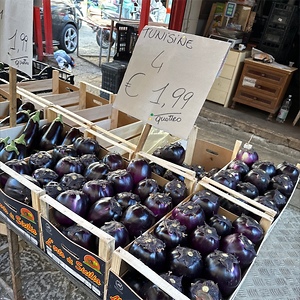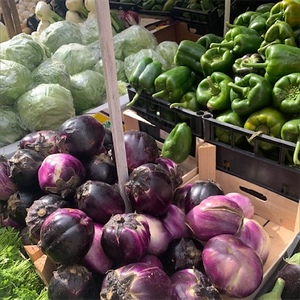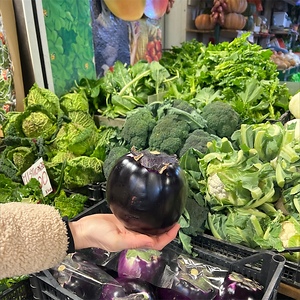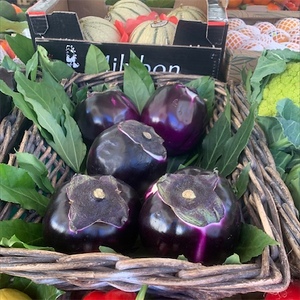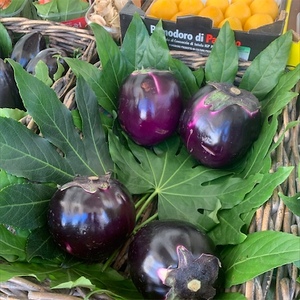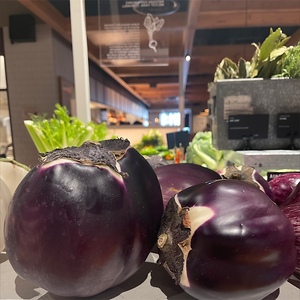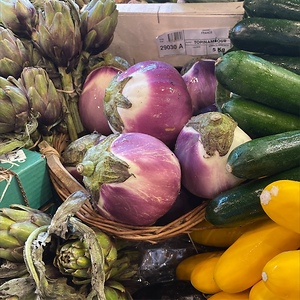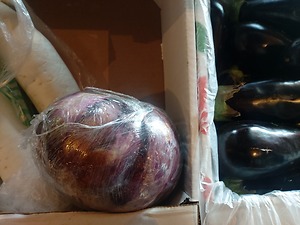

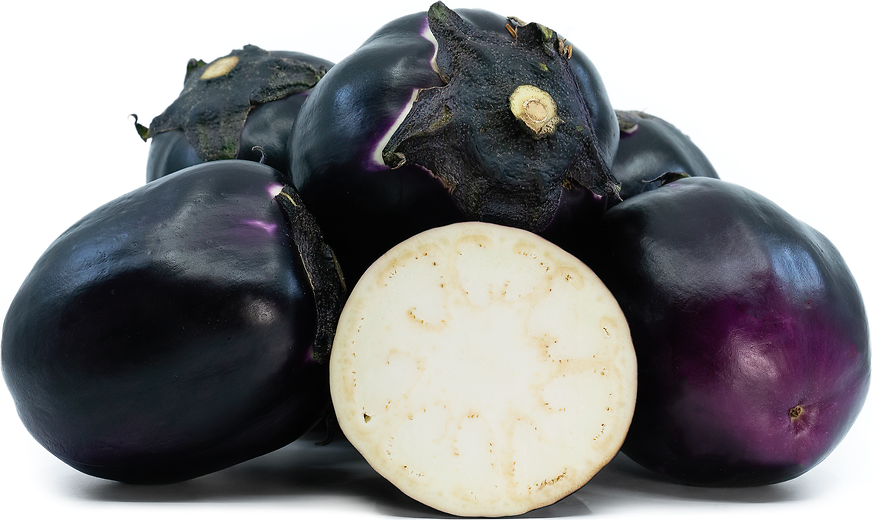
Prosperosa Eggplant
Estimated Inventory, lb : 0
Description/Taste
Prosperosa eggplants are a medium to large variety, averaging 10 to 15 centimeters in diameter and 10 to 12 centimeters in length, and have a round, ovoid, to slightly elongated shape. The variety is capped with a large, dark purple-green calyx that extends across the top of the eggplant and has a star shape with a rubbery, textured surface. The calyx is also topped with tiny soft spines, and beneath the calyx, the skin is white. The remaining portion of the eggplant’s skin is smooth, taut, and glossy, found in shades of dark purple, violet, and purple, almost black. Some eggplants may develop slight ribbing around the calyx and faint, vertical grooves depending on the climate and cultivation practices. Underneath the surface, the white flesh is slow to oxidize and is dense, spongy, and dry. There are also a few seeds scattered throughout the flesh. Prosperosa eggplants are not edible raw and must be cooked before consumption. Select fresh eggplants that feel heavy for their size and have a narrow oval marking at the eggplant’s base, also known as the belly button. Eggplants with a round spot at the base are thought to contain more seeds. Prosperosa eggplants, once cooked, develop a tender, succulent, and subtly chewy consistency and have a mild, sweet, and faintly bitter taste.
Seasons/Availability
Prosperosa eggplants are available in the late summer through winter.
Current Facts
Prosperosa eggplants, botanically classified as Solanum melongena, are an heirloom variety belonging to the Solanaceae or nightshade family. The mild, sweet cultivar is a type of round eggplant native to Italy grown as a specialty crop for culinary use. Prosperosa eggplants are also known as Melanzana Prosperosa, the Italian name for Prosperosa eggplant, Melanzana Tunisine or Tunisian eggplant, and Melanzana Tonda, meaning Round eggplant. Round eggplants are some of the most popular types of eggplant sold in markets in Sicily, and they are valued for their ability to be sliced into large pieces without absorbing excess oil. These flat, dense cuts are utilized in a wide array of cooked culinary preparations and are favored by chefs for their mild, sweet taste, low seed content, and versatility. Prosperosa eggplants are produced commercially and grown in home gardens throughout Italy, and the variety has been spread worldwide as a delicacy.
Nutritional Value
Prosperosa eggplants have not been studied for their nutritional properties. Like other round, purple eggplants, the variety may be a source of fiber to stimulate the digestive tract, phosphorus to repair cell tissues, magnesium to regulate optimal nerve functioning, and potassium to balance fluid levels within the body. The eggplants also provide copper to develop connective tissues, vitamin C to boost the immune system, vitamin K to assist in healing wounds, and other nutrients, including folate, niacin, manganese, and thiamine. The eggplant's dark purple flesh indicates the presence of anthocyanins, natural pigments within the skin with antioxidant-like properties to protect the cells against the damage caused by free radicals.
Applications
Prosperosa eggplants are best suited for cooked applications such as grilling, baking, frying, steaming, and stir-frying. The variety can be used for any recipe calling for common purple eggplant and is often chopped and tossed into soups, curries, and stews, hollowed and stuffed with grains, vegetables, and ground meats, fried and covered in tomato-based sauces, or grilled as a savory side dish. Prosperosa eggplants can also be cooked and mixed into pasta, blended into dips, sliced and layered into gratins, or baked into dishes such as ratatouille. In Italy, Prosperosa eggplants are commonly incorporated into caponata, which is a vegetable-based dish that can be served hot or cold as an appetizer, often spooned over toasted bread. Prosperosa eggplants pair well with fresh herbs such as basil, parsley, oregano, and coriander, cheeses such as parmesan, mozzarella, burrata, and cheddar, pine nuts, celery, tomatoes, zucchini, bell pepper, rice, pasta, and meats such as poultry, fish, turkey, and beef. The fresh eggplants will keep up to ten days when stored whole and unwashed in a plastic bag in a cool, dark place such as the refrigerator.
Ethnic/Cultural Info
In Italy, Prosperosa eggplant is a favored variety for use in parmigiana, which is a traditional dish that has been made for over two hundred years. First appearing in printed form in 1837 in Naples, the classic parmigiana recipe consists of thick slices of fried eggplant served with baked cheeses and tomato sauce. Parmigiana began in Southern Italy but quickly spread to other regions, and with its introduction, many variations of the recipe were created depending on the local ingredients available on hand. In the modern-day, parmigiana has also become popular throughout the rest of Europe and the United States. Known as eggplant parmesan in the United States, the savory dish is a favorite meal served at Italian restaurants across the country, and many Italian-American households also traditionally make the meal as a meatless dinner once a week.
Geography/History
Prosperosa eggplants are native to Italy and are descendants of eggplant varieties initially introduced from Asia and the Middle East in the 9th century. The exact dates of origin of Prosperosa eggplants are unknown, but some experts believe the variety may have first arisen from the Tuscany region. Later in the 10th century, Arabs carried eggplants to Sicily, where varieties were selectively bred for improved growing conditions. Other cultivars from Southern Italy were also planted on the island. Prosperosa eggplants eventually became a favored commercial and home garden cultivar throughout Italy and are a common variety sold in Sicilian markets for eggplant-centric culinary dishes. Today, Prosperosa eggplants are found throughout local markets in Italy, especially in Sicily, and are exported to other regions of Europe. The cultivar is also sold through online seed catalogs for home garden use in Europe and the United States. The eggplants featured in the photograph above were sourced through Ballaro Market in Palermo, Italy.
Recipe Ideas
Recipes that include Prosperosa Eggplant. One
| Andies Way |
|
Prosperosa Eggplant Becomes Pasta Alla Norma |



